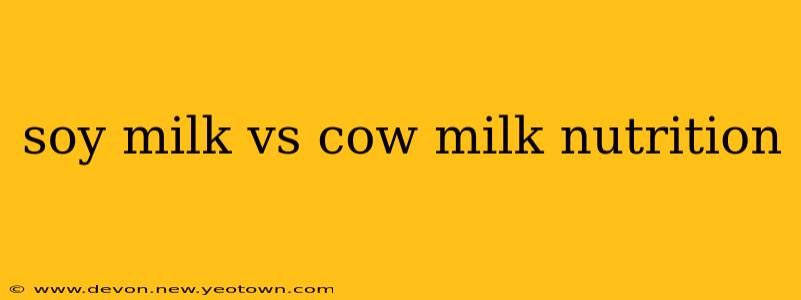The milk aisle can feel like a battlefield these days. Standing tall, facing off against the dairy champion, is soy milk – a plant-based contender vying for a spot in our fridges and our diets. But which one reigns supreme in the nutritional arena? Let's dive into a head-to-head comparison of soy milk and cow's milk, exploring their nutritional profiles and highlighting their unique benefits and drawbacks.
My name is Anya Petrova, and I'm a registered dietitian with over 10 years of experience helping people make informed choices about their nutrition. I've seen firsthand how confusing comparing different milk options can be, so I'm here to break it down for you in a clear and concise way.
What are the key nutritional differences between soy milk and cow's milk?
This is often the first question people ask. Both soy milk and cow's milk offer a range of nutrients, but their profiles differ significantly. Cow's milk is naturally rich in calcium, vitamin D, and protein, whereas soy milk is often fortified to match these levels. The big difference lies in the type of protein. Cow's milk provides casein and whey protein, while soy milk boasts soy protein. Soy protein is a complete protein, meaning it contains all nine essential amino acids, just like cow's milk protein.
Let's look at a typical nutritional comparison per cup (note that these values can vary depending on brand and fortification):
| Nutrient | Cow's Milk (1 cup) | Soy Milk (1 cup, fortified) |
|---|---|---|
| Calories | ~150 | ~100 - 150 |
| Protein (grams) | ~8 | ~7 - 10 |
| Carbohydrates (grams) | ~12 | ~8 - 12 |
| Fat (grams) | ~8 | ~2.5 - 7 |
| Calcium (mg) | ~300 | ~300 - 500 |
| Vitamin D (IU) | ~100 - 200 | ~100 - 200 |
| Vitamin B12 (mcg) | ~1 | often fortified to ~1 |
Is soy milk as good a source of protein as cow's milk?
This is a common concern. While cow's milk typically has slightly more protein per serving, soy milk, especially fortified varieties, comes pretty close. Both provide sufficient amounts of protein for many individuals. The type of protein is where they differ – cow's milk offers casein and whey, while soy milk provides soy protein. Both are complete proteins, meaning they contain all nine essential amino acids.
Does soy milk contain as much calcium as cow's milk?
Most commercially available soy milk is fortified with calcium to match or even exceed the calcium content of cow's milk. So, while cow's milk naturally contains high levels of calcium, you don't need to sacrifice calcium intake by choosing soy milk. Always check the nutrition label to confirm the calcium content of your specific brand.
Is soy milk good for your bones?
Both cow's milk and fortified soy milk can contribute to bone health due to their calcium content. However, other factors also play crucial roles in bone health, including vitamin D intake, weight-bearing exercise, and overall diet.
Which milk is better for weight loss?
Generally, soy milk tends to be lower in calories and fat than cow's milk, making it potentially more suitable for weight management if calorie intake is a concern. However, the impact on weight loss depends on many factors, including overall diet and exercise.
Which milk is better for people with lactose intolerance?
Soy milk is a great option for individuals with lactose intolerance, as it's naturally lactose-free. Cow's milk, on the other hand, contains lactose, a sugar that can cause digestive issues in people with lactose intolerance.
Which milk is better for the environment?
The environmental impact of both soy and cow's milk production is a complex issue with varying factors like farming practices and geographic location. However, studies suggest that soy milk generally has a smaller carbon footprint than cow's milk.
The choice between soy milk and cow's milk ultimately comes down to personal preferences, dietary needs, and health goals. Both offer valuable nutritional benefits, but their profiles differ significantly. Consider your individual requirements and make an informed choice that best suits your lifestyle. Remember to always check the nutrition labels as values can vary between brands.

